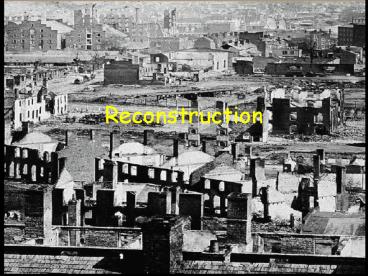Reconstruction
1 / 18
Title: Reconstruction
1
Reconstruction
2
Essential Question
- How was the nations commitment to its founding
ideals tested during Reconstruction?
3
Key Questions
1. How do webring the Southback into the Union?
4. What branchof governmentshould controlthe
process ofReconstruction?
2. How do we rebuild the South after
itsdestruction during the war?
3. How do weintegrate andprotect
newly-emancipatedblack freedmen?
4
Reconstruction
- Major Issues
- Status of former states
- Eleven Confederate States how/when can they
join the U.S? - Status of former slaves
- Four million Illiterate, unemployed, poor former
slaves - How much should the federal government help?
- Rebuilding the South
- 50 of manufacturing, agriculture and
transportation destroyed - Who should rebuild?
5
Radical Plan for Readmission
- Civil authorities in the territories were subject
to military supervision. - Required new state constitutions, including black
suffrage and ratification of the 13th and 14th
Amendments. - In March, 1867, Congress passed an act that
authorized the military to enroll eligible black
voters.
6
13th Amendment
- Ratified in December, 1865.
- Neither slavery nor involuntary servitude, except
as punishment for crime whereof the party shall
have been duly convicted, shall exist within the
United States or any place subject to their
jurisdiction. - Summary Slavery is abolished
7
14th Amendment
- Ratified in July, 1868.
- Provide a constitutional guarantee of the rights
and security of freed people regardless of race. - Southern states would be punished for denying the
right to vote to black citizens!
8
15th Amendment
- Ratified in 1870.
- The right of citizens of the United States to
vote shall not be denied or abridged by the
United States or by any state on account of race,
color, or previous condition of servitude. - Summary Right to vote regardless of race.
- Womens rights groups were furious that they were
not granted the vote!
9
Changes in the Southern Economy
- Sharecropping and tenant farming
- Cycle of poverty
- Restoration of plantations
- Challenges
- KKK
- Scandals
- Popular support declines
- End of Reconstruction Compromise of 1877
10
Black Codes
- Purpose
- Guarantee stable labor supply now that blacks
were emancipated. - Restore pre-emancipationsystem of race
relations. - Forced many blacks to become sharecroppers
tenant farmers.
11
How Sharecropping Works
Furnishing Merchant Tenant Farmer Landowner
Loan tools and seed up to 60 interest to tenant farmer to plant spring crop. Farmer also secures food, clothing, andother necessities oncredit from merchant until the harvest. Merchant holds lien mortgage on part of tenants future crops as repayment of debt. Plants crop, harvests in autumn. Turns over up to ½ of crop to land owner as payment of rent. Tenant gives remainder of crop to merchant inpayment of debt. Rents land to tenant in exchange for ¼ to ½ of tenant farmers future crop.
12
Sharecropping
13
The Invisible Empire of the South
14
Worse Than Slavery
- What do you see?
- What artistic devices are used?
- Who is shaking hands?
- What scene is shown beneath the two men?
- Why do you think this scene is labeled Worse
Than Slavery? - What do you think is the message?
15
(No Transcript)
16
Segregation and Discrimination
- Voting Restrictions
- Literacy tests
- Poll tax
- Grandfather clause (white only)
- Jim Crow Laws
- Legal separation (segregation) of races
- Plessy v. Ferguson
- 1896 U.S. Supreme Court decision allows separate
but equal
17
Success or Failure?
- Success
- Social and Political Revolution
- Former slaves participate in government
- Expanded public education
- Redistribution of land
- Restoration of former slave families, churches,
and communities
- Failure
- Political parties unable to continue reform
- Continuation of Cycle of Poverty
- Racial bias and intimidation
- Not aligned with National priorities ex-slave
issues vs. economic issues
18
U. S. Review Topics Unit 1
- Abolitionists
- Popular sovereignty
- Kansas-Nebraska Act
- Dred Scot v. Sanford
- Anaconda Plan
- Sharecropping
- Total war
- Jim Crow laws
- Plessy v. Ferguson
- Compromise of 1877
- Emancipation Proclamation
- 13th Amendment
- Outcomes of the Civil War
- African Americans after Civil War
TEST Friday 9/18 13 Multiple Choice, 8 Short
Answer Use notes, textbook, www.kdircks.wikispaces
.com for information































